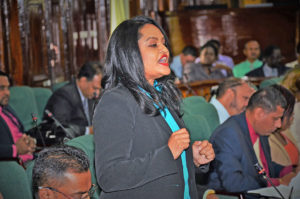
Chapter 8: 01, Section 96 of the Criminal Law Offences Act outlines that persons found guilty of trying to take their own lives would face up to two years’ imprisonment. Government has recently signalled that this law could be amended, having announced that the law was among several others that were under review.
This disclosure followed a meeting with United Kingdom (UK) consultant Peter Pursglove under the Support for the Criminal Justice System Programme.
However, People’s Progressive Party/Civic (PPP/C) Member of Parliament (MP) Dr Vindhya Persaud, while welcoming the move, questions why Government had struck down a similar motion she had brought to the National Assembly in 2016.
In an interview with Guyana Times International on Tuesday, she highlighted several of the measures that were enshrined in the motion she had fronted. She said her motion would have strengthened the systems needed to reduce incidents of suicide.
Dr Persaud remarked that attempted suicide should never have been criminalised.
“When people attempt suicide, it is a cry for help; and rather than penalising them, as is recommended by the current law, they should be offered a chance at rehabilitation, and perhaps be treated for other underlying causes that would have led to suicide, including depression and addiction,” the MP stated.
Though there had been extensive debate on the matter, Government did not support Persaud’s motion on ground that her presentation was too politicised. Two Members from the Government side — Public Security Minister Khemraj Ramjattan and Minister within the Public Health Ministry, Dr Karen Cummings — had notably supported the decriminalisation of suicide, but they later voted down the motion, in keeping with the decision of their colleagues.
Guyana had been ranked second in the world with the highest suicide rate per capita. Its ranking has since shifted to fourth place, but Dr Persaud is positing that more needs to be done to tackle mental health challenges. The anti-suicide activist highlighted that, in 2016, health authorities were seeing more cases in which young people were taking their lives, primarily in Essequibo and Berbice, but not exclusively there.
“I think the conversation has started, as people are beginning to realise the importance of mental health, and the repercussions it can have in every sector, when you think of education and the work force, and how it can impact and burden the healthcare system,” she noted.
Persaud had called for more collaboration between local stakeholders and international agencies such as the Pan American Health Organisation/World Health Organisation (PAHO/WHO) and the United Nations Children’s Fund (UNICEF). Her motion had spoken to the need to have counsellors in the schools, with some teachers being trained to deal with the issues and being incentivised in this regard.
Persaud also told this newspaper that she had been pushing for control to be placed on access to poison by means of a two-key system being implemented.
The PPP/C Member of Parliament nevertheless pointed out that the review was long overdue, but she also questioned why Government waited to effect the change after meeting with the consultant.
“I wonder if this Government is not conscious of what is happening in the country? Because these are not issues that are new, and someone has to come from somewhere and tell us about (it when) we are well aware of it?” she stressed.
This publication was unable to contact Junior Public Health Minister Dr Karen Cummings for comments on her position on the matter from a medical perspective. Activists against the law, meanwhile, say that criminalising offenders would not be an appropriate measure to tackle the issue as Guyana moves to reduce such deaths, which were recorded at 44 persons per 100,000 in 2012.
During the auspices of World Suicide Prevention Day in 2016, Senior Psychiatrist Dr Bhiro Harry disclosed that the Mental Health Ordinance was revised and was under review, but that draft legislation did not include penalties for attempting suicide.



